The Vivekananda International Foundation (VIF) hosted a delegation from Shanghai Institute of International Studies on 19 September 2019 at VIF. The delegation was led by Dr Chen Dongxiao, the other members of the delegations were Liu Youfa (served as Ambassadorial Consul General of China to Mumbai), Liu Zongyi, Cao Jiahan and Sun Shasha.
The welcome remarks were delivered by Dr Arvind Gupta. He gave an overview of India-China relations and credited the leadership of both the countries for taking the bilateral relations forward. The interaction was centred on India-China bilateral relations, Indo-Pacific vision, Chinese Perspectives of India and US-China Trade Frictions. The salient points that emerged from the discussion follow.
Agenda for the Next Informal Summit
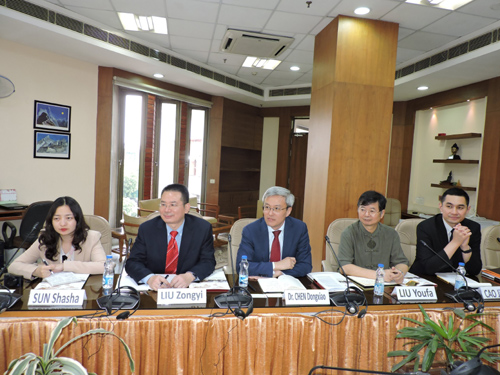 The Chinese delegates were brainstorming the agenda for the upcoming second informal Modi-Xi summit. The Indian delegates suggested that the informal meeting should take forward the ‘early harvest’ issues on the border that was floated during the first informal summit. The people-to-people contact has fairly done well between the two sides. Also, the issue of trade deficit, investment in Greenfield sectors, entry of Chinese companies in the infrastructure sector, non-tariff barriers for Indian commodities, removing the restriction on the entry of the Indian information technology sector and pharmaceuticals needed to be discussed. Altogether, the Indian side suggested that the informal summit should cover everything that matters in the bilateral relations. On the other hand, the Chinese side suggested that the issue discussed during the informal summit should keep in mind the domestic audience/problem within their respective countries.
The Chinese delegates were brainstorming the agenda for the upcoming second informal Modi-Xi summit. The Indian delegates suggested that the informal meeting should take forward the ‘early harvest’ issues on the border that was floated during the first informal summit. The people-to-people contact has fairly done well between the two sides. Also, the issue of trade deficit, investment in Greenfield sectors, entry of Chinese companies in the infrastructure sector, non-tariff barriers for Indian commodities, removing the restriction on the entry of the Indian information technology sector and pharmaceuticals needed to be discussed. Altogether, the Indian side suggested that the informal summit should cover everything that matters in the bilateral relations. On the other hand, the Chinese side suggested that the issue discussed during the informal summit should keep in mind the domestic audience/problem within their respective countries.
Indo-Pacific
The Chinese delegates exhibited their concerns on the progress of the concept of the Indo-Pacific. They argued that for the US it is a strategy in the region to isolate China. While other countries have different perspectives on the concept. They put forth the point that China is open to any kind of proposal in the Indo-Pacific region that maintains harmony and cooperation in the region. They also expounded on the Chinese vision of Indo- based on multi-polarity, multilateralism, inclusiveness with the centrality of ASEAN.
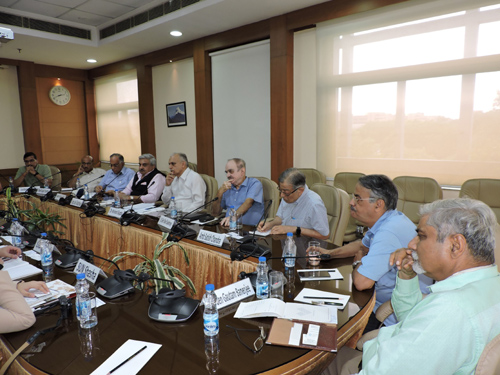 The Indian participants stated that the intention of India was not to isolate any country. Recently, Prime Minister Narendra Modi launched the 'Act Far East' policy during his two-day visit to Russia, where he announced a USD 1 billion line of credit for the development of the resource-rich region. He asserted that India will walk cooperate with Russia in its development of the Far East. A proposal had been made to have a full-fledged maritime route between Chennai and Vladivostok. A Memorandum of Intent was signed in this regard. Additionally, India is also developing its relationship with the US.
The Indian participants stated that the intention of India was not to isolate any country. Recently, Prime Minister Narendra Modi launched the 'Act Far East' policy during his two-day visit to Russia, where he announced a USD 1 billion line of credit for the development of the resource-rich region. He asserted that India will walk cooperate with Russia in its development of the Far East. A proposal had been made to have a full-fledged maritime route between Chennai and Vladivostok. A Memorandum of Intent was signed in this regard. Additionally, India is also developing its relationship with the US.
Chinese Reactions to the Reorganisation of the Indian States
The Indian side flagged the issue of China raising Kashmir at the behest of Pakistan in the United Nation Security Council (UNSC). The Indian participant made it clear that the abrogation of Article 370 of the Indian Constitution related to the state of Jammu and Kashmir was an internal affair of India and no other had the authority to comment on it. History is a testimony to the fact that it is Pakistan, through its occupation and support to terrorism, is bringing changes in this area. On the Chinese position in the UNSC, Indian side reiterated that the incident has been seen in India from a negative perspective. China went out of its way to support Pakistan. As China is supporting Pakistan they should not forget that it is a daily exporter of terrorism. The Chinese side argued that their posture is shaped by the depth of the relationship with Pakistan and they have to manage it, as far as possible. They are answerable to the domestic audience and maintain a certain level of consistency in their policy towards Pakistan.
Developments in the Middle East
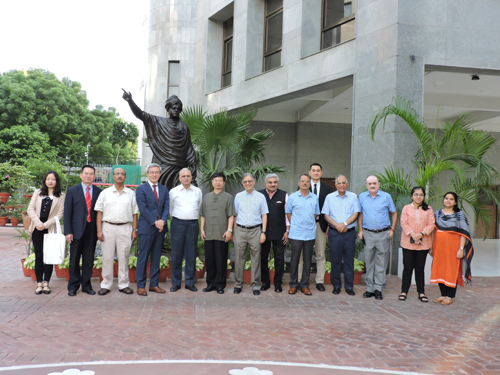 The Chinese participants flagged the issue of developments in Iran, Saudi Arabia, increasing oil price and their long –term effect on both Indian and Chinese economies. Indian side stated that India and China are the largest buyers of oil from this region and therefore India is equally concerned with the Joint Comprehensive Plan of Action (JCPOA) and other serious developments. India has half of its diaspora living in this region and will take a position based on its national interest.
The Chinese participants flagged the issue of developments in Iran, Saudi Arabia, increasing oil price and their long –term effect on both Indian and Chinese economies. Indian side stated that India and China are the largest buyers of oil from this region and therefore India is equally concerned with the Joint Comprehensive Plan of Action (JCPOA) and other serious developments. India has half of its diaspora living in this region and will take a position based on its national interest.
Prospect for Cooperation
Indian participants finally stated that there is a need to make concrete progress on the border issue. India is also concerned at the violation of its sovereignty by the China Pakistan Economic Corridor (CPEC). There is an urgent need for China to rethink its ties with Pakistan that impinges negatively on India. The Chinese side said there should be cooperation and coordination in policies related to multilateral institutions and the international financial system.
Both sides agreed that there should be frequent people to people exchanges. It was agreed that both countries should take responsibility to pave the way for long term sustainable relations.

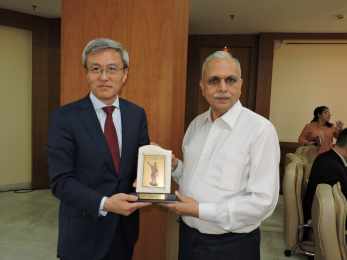






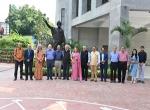
Post new comment